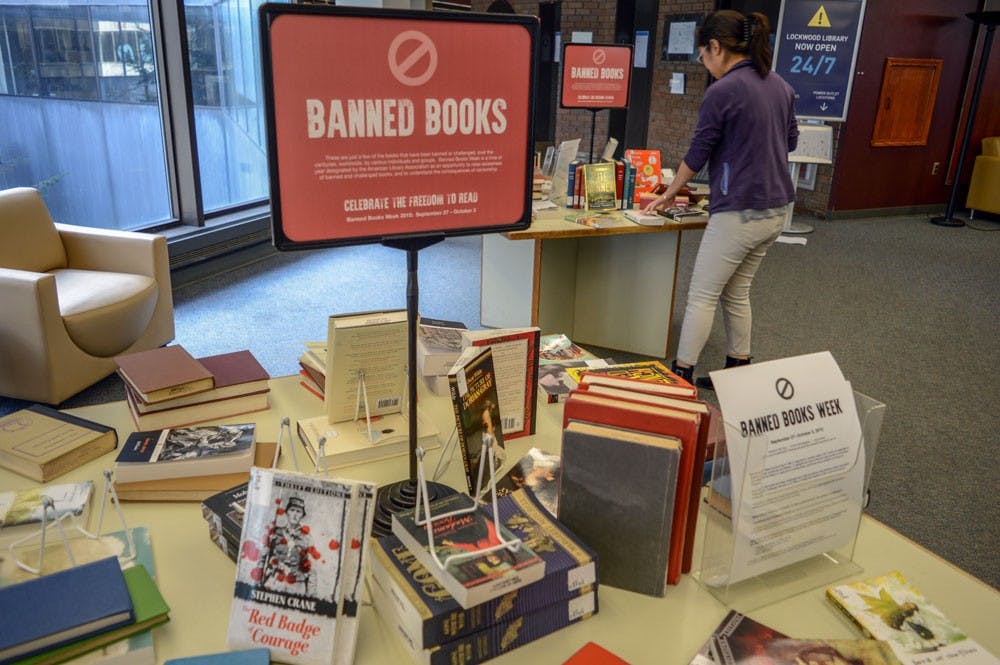Denise Wolfe said one of the best advantages to living in the United States is that people can read what they want, when they want.
Lockwood Memorial Library is displaying commonly challenged books to remind students and faculty of freedom of speech. Books Week is a nationwide effort to recognize controversial literature and the freedom to write without censorship. UB’s banned book display will remain in Lockwood from Sept. 28 until Oct. 31.
Homosexuality, violence, nudity and other “anti-family” themes are a few reasons for the attempted banning of hundreds of classic and contemporary books, according to the American Library Association (ALA). The Great Gatsby, To Kill a Mockingbird and the Harry Potter series are just a few of the famous books that have caused concerned parties to make attempts at censorship.
Wolfe, coordinator of administrative services of university libraries, and Laura Taddeo, head of the Arts, Humanities and Social Sciences team at Lockwood Library, are using Banned Books Week as an opportunity to attract students to the library with its hands-on display, which is centered upon interaction.
“We used to have glass cases in the front with photos and snippets of text,” Taddeo said. “We wanted it to be more interactive and have people actually see the books.”
By focusing on efforts across the country to remove or restrict access to books, Banned Books Week draws national attention to the harms of censorship, according to the ALA website.
Wolfe looks at the event as a mean of discovery and hopes it will broaden people’s search for knowledge and encourage conversations.
The display, made up of two tables covered in a colorful variety of books ranging from the 18th century to the modern era, is meant to catch the eyes of passing students.
Shaun Nowicki, a freshman English major, said banning books is “immoral.”
“It’s depriving people of experiences that show them the world [because] books help people to see through the worst parts of life – they’re a safe haven for people,” Nowicki said.
“It doesn’t matter what’s in them or if one single person likes them, as long as they bring comfort to someone.”
Anna Spring, a freshman environmental engineering major, criticized the rationalization for censorship.
“These [books] exist,” Spring said. “Whoever made it did so with the intention that people would see it, and they did so for a reason. To label anything as ‘universally offensive’ is ridiculous.”
Brenna Zanghi, a freshman English major and a former page at her local library, said people would often complain about the content of the book Speak by Laurie Halse Anderson, which chronicles a high-school girl’s journey to accepting that a fellow student raped her at a party.
After explaining that it’s public material and that no individual has the right to remove it, it would coincidentally be marked missing that same day, Zanghi said.
Zanghi said library displays had to be clear of any references to religion, curse words or intense material, or they would be stolen.
“When people think of censorship, they think of a huge group entirely separate from themselves or the government, but attempts at censorship are alive, going on in everyday life,” Zanghi said.
Speak can be found at UB’s banned book display.
The display is considered to be part of a usable collection of books that will help to open students’ eyes to the resources available in the library, according to Taddeo. She said Lockwood is not just a space to sit at the computer.
There will be a will be a “Read Out” for students to read books from the display on Monday, Sept. 28, at 3 p.m.
Michael Joncas is a contributing writer and can be reached at news@ubspectrum.com.





